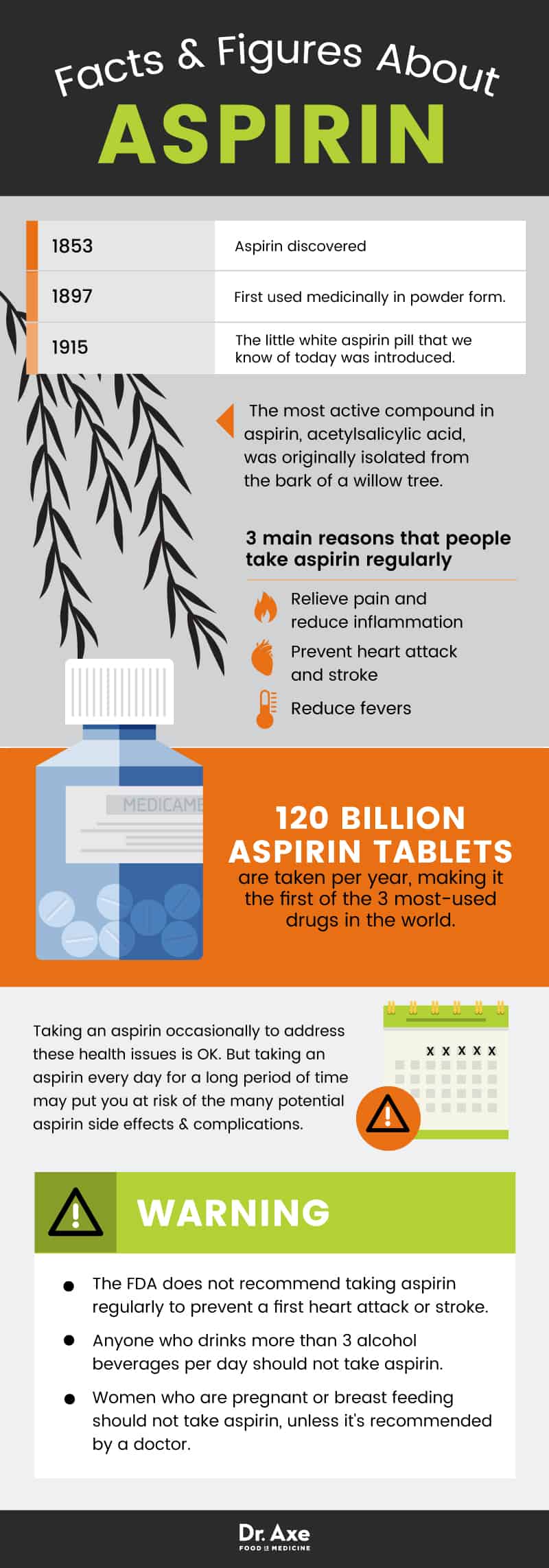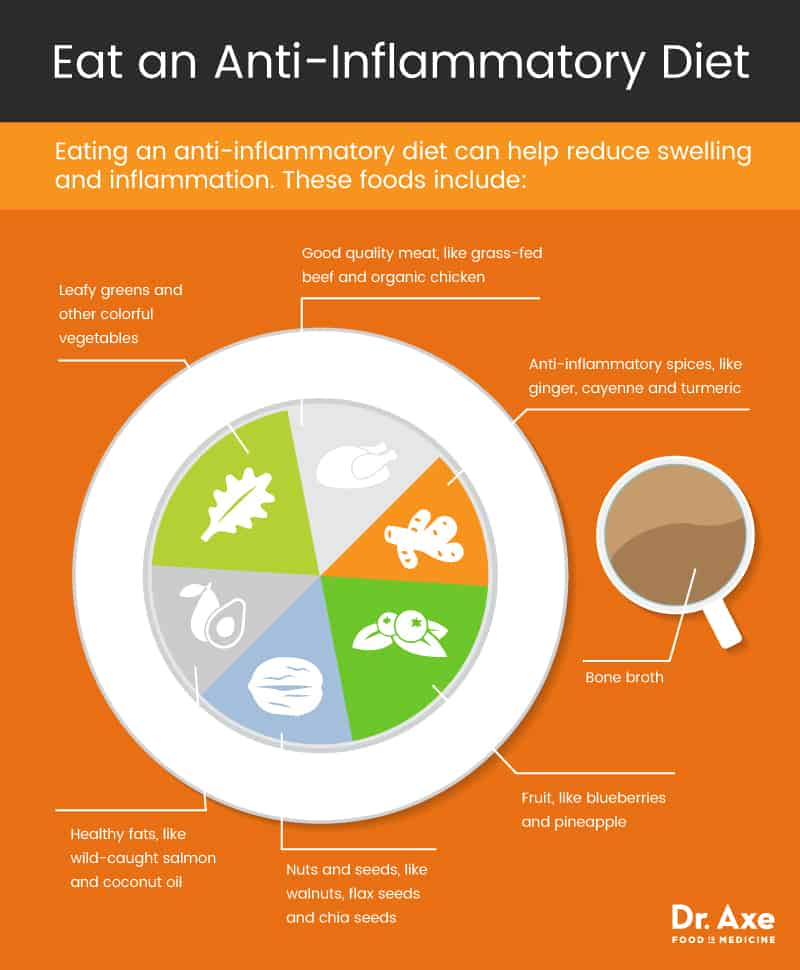
We’ve been told about the dangers of NSAIDs, but why do so many people overlook warnings when it comes to aspirin? It may be because aspirin works to reduce hormone-like substances in the body that promote inflammation and blood clotting. But I’d argue that some people who are taking aspirin regularly for a long period of time are not at a great risk of vascular disease, and the potential aspirin side effects may outweigh the pill’s benefits.
Here are some questions to ask yourself and hopefully answer with the help of this information: do I fit into the category of people who should be taking aspirin every day to prevent a second heart attack or stroke? And if so, is regular aspirin use right for me?
What Is Aspirin?
Aspirin was discovered in 1853, but it wasn’t until 1897 that it was used medicinally in powder form. Then the little white aspirin pill that we know today was introduced in 1915. The most active compound in aspirin, acetylsalicylic acid, was originally isolated from the bark of a willow tree. Did you know that this aspirin ingredient can also be found in beans, peas, jasmine and clover? The ancient Egyptians actually used willow bark to relieve pain long before they understood the benefits of salicylic acid.
Other ingredients in aspirin include cornstarch, hypromellose, powdered cellulose, triacetin (a solvent) and carnauba wax.
There are three main reasons that people take aspirin regularly:
to relieve pain and reduce inflammationto prevent heart attack and stroketo reduce fevers
For people with a history of heart attack, chest pain or ischemic stroke, aspirin is used as a preventive therapy. Aspirin is also taken to reduce the risk of cancer, especially colorectal cancer.
This little white pill is ingested at a jaw-dropping rate of 120 billion tablets per year, making it the first of the three most-used drugs in the world. You may be wondering, why do so many people take aspirin on a daily basis? It’s because aspirin use is recommended for males between the ages of 45 and 79, and females ages 55 to 79, to reduce their risk of heart attack and stroke. So it doesn’t look like aspirin use will be decreasing anytime soon, with these recommendations being made by researchers and doctors.
Aspirin works by reducing prostaglandins, which are hormone-like substances that control the body’s inflammatory responses and processes like blood flow and the formation of blood clots. This is how taking an aspirin can help to reduce your risk of stroke and heart attack, which are caused by clots in your coronary arteries or blood vessels.
Taking an aspirin occasionally to address these health issues is not my concern, but when you are taking an aspirin every day for a long period of time, you are putting yourself at risk of the many potential aspirin side effects and complications.
Is It Safe to Take Aspirin Every Day?
The FDA does not recommend taking aspirin regularly to prevent a first heart attack or stroke. For people who are at the greatest risk of heart attack or stroke, the threat of these conditions may outweigh the seriousness of aspirin side effects. Whether or not regular aspirin use is right for you and your current health condition is an issue that should be addresses with your doctor.
Research actually shows that occasional aspirin use may be just as beneficial as long-term regular use. A 2016 study published in the European Journal of Clinical Investigation analyzed the effects of occasional and regular use of low-dose aspirin taken for prevention of vascular diseases. Researchers investigated 1,720 pairs of patients taking aspirin occasionally or regularly between the years 1997 and 2000. They found that hemorrhage and stroke occurred in 25 and 67 occasional aspirin users and 69 and 100 regular users. The development of cancer was also tracked and it occurred in 32 occasional users and 26 regular users. Researchers concluded that long-term regular use of aspirin my not be better than occasional use in the prevention of heart attack and stroke.
For people who are taking aspirin every day as a preventive therapeutic agent, this is something to consider. Is regular aspirin use necessary for you and your health condition? And do the potential aspirin side effects outweigh the potential benefits of aspirin?

Aspirin Side Effects
1. Kidney Failure
Research shows that damage to the kidneys from regular aspirin use, which is called analgesic nephropathy, can occur. Analgesic nephropathy is a form of chronic insufficiency of the kidneys that results from long-term regular ingestion of analgesic medications like aspirin. Many times this chronic kidney disease exists without the development of immediate symptoms and it leads to deadly kidney failure or the need for daily kidney dialysis.
A 2016 review of evidence published in the Korean Journal of Family Medicine found that long-term aspirin use in high doses may be associated with renal insufficiency, but the data is mixed, with some researchers finding positive associations between aspirin abuse and kidney damage and others failing to connect the two. One study did show that mixing acetaminophens and aspirin is associated with greater kidney toxicity than just using aspirin alone.
A study published in the European Journal of Heart Failure found that the renal effects of aspirin are dose dependent and there could be an adverse influence of aspirin at doses higher than 80 milligrams, especially for patients with heart failure.
2. Liver Failure
When you use aspirin regularly, it is absorbed by the liver, which can lead to liver disease or failure. This is a serious problem because the liver is your body’s detoxification system. And when toxins are continually put into your body, you can experience a toxic overload that causes the liver to stop working properly.
A 2014 case report conducted at Georgetown University Hospital indicates that drug-induced liver injury has an estimated prevalence of 10 people per 100,000 over-the-counter (OTC) drug users. Researchers found that high-dose aspirin can be a potentially hepatotoxic agent. When a 41-year-old women was treated with high-dose aspirin, she developed an acute liver injury that resolved with the discontinuation of aspirin. This showed researchers that although there aren’t many studies discussing the role of aspirin in liver injury, it should be considered dangerous at high doses.
3. Ulcers
According to the American College of Gastroenterology, the second leading cause of stomach ulcers is the regular use of aspirin, which leads to irritation of the stomach lining and the formation of painful sores. On top of that, the regular use of aspirin when an ulcer already exists can lead to further complications, including bleeding ulcers and perforated ulcers.
And research published by the Journal of Multidisciplinary Healthcare points out that the gastrointestinal side effects that are associated with aspirin therapy are a major complication in patients with gastrointestinal ulcers. Researchers have found that aspirin and Helicobacter pylori, a type of bacteria that infects the stomach, are both important contributors to ulcer development.
4. Tinnitus and Hearing Loss
Tinnitus is a ringing in the ears that’s usually a symptom of an underlying disorder that affects your auditory sensations and the nerves near your ears. It can be caused by excessive use of aspirin and serves as an early sign of toxicity.
According to a systematic review conducted at Harvard Medical School, among the 45 to 79-year-old age group that routinely uses aspirin, there is a 13–68 percent prevalence of hearing loss. Researchers found that a dose of 1.95 grams of aspirin a day is associated with worse results when it comes to hearing. They also suggested that the adverse effects are dose dependent and reversible by reducing aspirin use.
5. Hemorrhagic Stroke
Although some people take aspirin on a daily basis to thin their blood in order to prevent heart attack and stroke, aspirin use can actually do more harm than good in some cases. Sometimes, strokes are caused by bleeding in the brain. And when blood-thinning aspirin is used, it only exacerbates the problem and could potentially lead to permanent brain damage or even death.
Researchers at the University of Illinois suggested that the “absolute therapeutic cardiovascular benefits of aspirin must be balanced with the possible risks associated with its use, with the most serious being hemorrhagic stroke.” Although studies have found that the risk of a major hemorrhage due to aspirin use is small, occurring in 0.2 events per 1,000 patients a year, it is still an aspirin side effect that should be considered before turning to aspirin as a secondary preventive measure for heart attack and stroke.
6. Reye’s Syndrome
Reye’s syndrome is a deadly condition that damages the vital organs of children, especially the brain and liver. Research indicates that Reye’s syndrome is extremely rare, but often fatal, with about 30–40 percent of cases leading to death because of brainstem dysfunction. The condition most commonly affects children and teenagers who are recovering from the flu or chickenpox, and aspirin use has been linked to the development of Reye’s syndrome. Researchers suggest that the drug acts as a cofactor in susceptible individuals. For this reason, children and teens with viral infections should never be given aspirin.
According to research published in Drug Safety, illness severity may depend on the aspirin dose, although it seems that if aspirin is taken in the presence of a viral infection, no dose of aspirin can be considered safe.
7 Natural Aspirin Alternatives
1. Anti-inflammatory Diet
If you are taking aspirin to reduce inflammation and swelling, there are other, safer and more natural ways to do so. And the best place to start is with your food choices. First off, you want to avoid eating foods that promote inflammation, swelling and pain — like junk food, processed and packaged foods, foods with artificial ingredients and added sugars, and too much caffeine and alcohol.
Instead, focus on eating foods that will promote your health and reduce inflammation. These anti-inflammatory foods include:
Leafy greens and other colorful vegetablesFruit, like blueberries and pineappleHealthy fats, like wild-caught salmon and coconut oil Bone broth Nuts and seeds, like walnuts, flax seeds and chia seedsGood quality meat, like grass-fed beef and organic chickenAnti-inflammatory spices, like ginger, cayenne and turmeric
2. Ginger
Did you know that ginger has anti-blood-clotting abilities? Eating ginger regularly can actually help you to prevent heart attack and stroke. Plus, ginger health benefits include its anti-pain and anti-inflammatory properties. Gingerol, the most therapeutic component in ginger, acts on receptors that are located on your sensory nerve endings.
Because of its ability to reduce pain and inflammation, ginger is often used as a natural therapy for degenerative conditions like arthritis and rheumatism, and cardiovascular disorders like hypertension and atherosclerosis.
3. Turmeric
Research shows that turmeric benefits go beyond those of anti-inflammatory drugs, anticoagulants, and pain killers. Plus, turmeric has relatively no known side effects unless it’s taken in extremely excessive amounts. Studies also indicate that curcumin — the most beneficial compound in turmeric — possesses anti-thrombotic activities and daily consumption of turmeric may help you to maintain anticoagulant status.
Researchers also suggest that turmeric extracts can be used to alleviate pain. A meta-analysis published in theJournal of Medicinal Food found that 1,000 milligrams of curcumin per day effectively relieved pain in patients with arthritis. In fact, five studies showed that there was no significant difference between the efficacy of turmeric and pain medicine.

4. Cinnamon
Cinnamon has anti-inflammatory and heart disease-protecting abilities. Studies show that a major cinnamon health benefit is its ability to reduce several risk factors for heart disease, including high blood pressure and high cholesterol levels. Cinnamon works as a natural blood coagulant and it increases blood circulation. It can also advance tissue repair, which aids the regeneration of your heart cells so that it can fight heart attacks and stroke.
5. MSM (Methylsulfonylmethane)
MSM is an adaptogen herb that helps your body deal with stress and heal after injuries, surgeries, exercise and stressful events. MSM supplements are often used to relieve chronic pain, muscle cramps, high blood pressure and eye inflammation.
MSM combats inflammation by adding sulfur to your body, which helps to repair the rigid, fibrous tissue cells that are in your muscles. MSM also helps to restore the flexibility and permeability of the cell walls within your muscles, helping them to repair more easily.
6. Bromelain
This enzyme found in pineapples is often used to treat inflammation in conditions like arthritis. Research shows that it can be used to relieve post-operative pain and swelling, joint pain and inflammation of the sinuses.
Research published in Biomedical Reports indicates that two major bromelain health benefits are its anti-inflammatory and anti-thrombotic effects. It effectively increases blood circulation and boosts the immune system.
7. Magnesium
Did you know that a magnesium deficiency can lead to health issues like hypertension and cardiovascular disease, kidney and liver damage, muscle cramps, depressed immune system and migraine headaches?
Taking magnesium supplements can support your blood pressure levels and prevent hypertension. According to the Journal of Clinical Hypertension, conditions of the heart such as coronary heart disease, ischemic stroke and cardiac arrhythmias can be prevented or treated with magnesium intake.
Risk Factors and Precautions
If you are taking aspirin regularly, it’s important that you consult with your doctor about possible interactions, especially if you are currently using any other medicine (both OTC and prescribed drugs), vitamins and herbal supplements.
There are some medications that can affect the way that aspirin works in your body. These include: arthritis medications; medications used to treat chronic gout symptoms; blood pressure medications; blood thinners and medications used to treat blood clots; steroid medicine; and medications to treat seizures.
Some people are more susceptible to complications from long-term aspirin use and they should not be taking this drug, especially on a daily basis and in larger doses. This includes people with the following health conditions:
Heart failureLiver or kidney diseaseAsthmaStomach ulcersBleeding or clotting disordersUncontrolled blood pressure Diabetes
People who are allergic to aspirin or other NSAIDs, and those with a history of asthma with nasal polyps and rhinitis should never take aspirin. If you are allergic to aspirin, you may break out in hives, experience facial swelling, wheezing and even shock.
Anyone who consumes more than three alcoholic beverages per day should not take aspirin and it also shouldn’t be used by women who are pregnant or breastfeeding, unless it’s recommended by a doctor.
Key Points on Aspirin Side Effects
Aspirin is an anti-inflammatory drug that’s used to reduce pain and inflammation, relieve pain and reduce fever.Although daily aspirin use is recommended for adult men and women in the prevention of heart attack and stroke, it’s important to understand that taking aspirin doesn’t come without risks. The most dangerous aspirin side effects include kidney damage, liver damage, ulcers, hearing loss, hemorrhagic stroke and Reye’s syndrome.Long-term aspirin use can be especially dangerous for people with the following health conditions: heart failure, liver or kidney disease, asthma, stomach ulcers, blood clotting disorders, uncontrolled blood pressure and diabetes.
7 Top Aspirin Alternatives:
Anti-inflammatory diet
Ginger
Turmeric
Cinnamon
MSMr
Bromelain
Magnesium
From the sound of it, you might think leaky gut only affects the digestive system, but in reality, it can affect more. Because Leaky Gut is so common, an enigma.
Source: Dr. Axe.
No comments:
Post a Comment